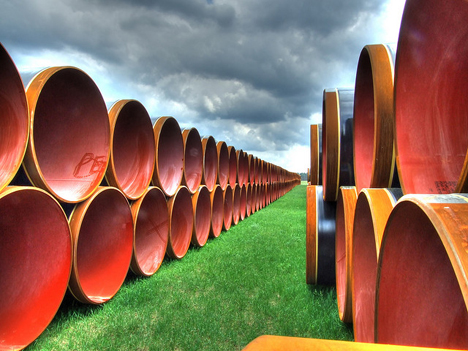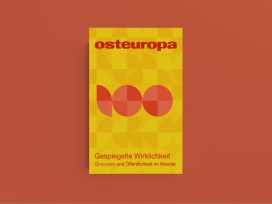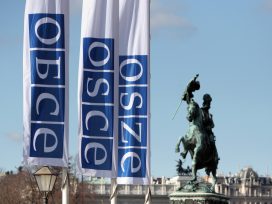How to win Cold War II
The West must start to put its long-term interests above the instant gratification of London bankers, German gas traders and real estate dealers all over Europe, who are yearning for Russian money. Then the new Cold War can be won, writes Vladislav Inozemtsev.
In a recent Facebook update, one of the most knowledgeable western experts on Russia, the former US Ambassador in Moscow Michael McFaul accepted the obvious: “Tragically, we are entering a new period with some important differences, but many similarities to the Cold War”. McFaul expressed the hope “that this dark period will not last as long as the last Cold War”. This is an important step towards grasping the situation in realistic terms, a step that the entire western world has been extremely reluctant to take. One could only hope that the US and Europe would follow the example of an experienced political expert and stop seeing in Vladimir Putin a man of decent intentions.

Pipes for the transportation of gas. Photo: Steffen Sameiske. Source:Flickr
If they did, everything would fall into place. The Russian post-communist revanchist elite, having embezzled national wealth, at some point felt ready to re-establish its traditional “habitat”: an authoritarian society characterized by imperial ideology and management that relies on brute force and a “command economy”. In recent years, the West has done everything possible to help them realize this goal. The West has invited Russia to participate in the G8 and been exalted by its success. Putin’s face has been on the cover of every respected magazine and his name has surged to the top of every rating of influential people. All this has strengthened the Russian monarch’s belief in his omnipotence. Now the chickens have come home to roost.
However, the last thing we need now is finger-pointing. What we need is instead careful analysis and a new strategy. Russia did not get appeased. Run by KGB officers it could simply not have been integrated into the western world. Now the new Cold War is a reality, and the task of the West must be to win it as quickly as possible and with a minimum of expenses, without alienating Russian people or turning it into a sworn enemy of the civilized world.
By grabbing Crimea (and, I believe, Putin has more in store for us) Moscow violated international law. In fact, this violation is so grave that the world might turn away from Russia. Not punish it, but ignore it. The opposite of love is not hate, but indifference. This should be the foundation of the western approach to Russia.
Russia critically depends on the world outside its borders. There is, practically, no Russian high-tech industry and, to a very large extent, Russia imports medicine, food and consumer goods. It pays for everything it buys overseas using the revenue from oil, gas and other raw materials, which make up 77 per cent of Russia’s exports. The main source of state income comes from custom duties (more than 50 per cent), not from tax collection. The main tool of exerting pressure on Russia would be a gradual reduction of imports of its commodities. This would lead the Russian elite to limit its people’s access to western goods even more efficiently than any western economic sanctions.
The US and Europe should not slap sanctions on Russia. They should simply rearrange their energy imports priorities. In two to three years the EU would be able to reduce the oil and gas deliveries from Russia: Middle Eastern suppliers would be happy to fill the gap. Putin has increased the westward-oriented export of Russian energy resources to such a degree that it would be impossible to make a sudden U-turn and send the west-Siberian oil and gas to China instead: currently, less than 17 per cent of Russia’s oil and gas exports go to the east. At present there is simply no money to pay for new pipelines to the east. Cutting European energy imports from Russia by half would result in a drop of the Russian export revenues by a third: 150 billion dollars annually.
Furthermore, there is actually no real need for the US and Europe to impose financial sanctions on Russia: “suggesting” to the rating agencies that it would make sense to lower Russia’s credit score would suffice. Despite the widely accepted idea that Russia has almost no external debt, on 1 January 2014, the Russian government and corporations owed 732 billion dollars to foreign creditors, which is 44 per cent more than the Bank of Russia’s foreign exchange reserves (510 billion dollars for the same date). Any confrontation with the West would cause a large-scale capital flight. If one adds to the equation a lower credit rating and the call for the early debt repayment due to covenant violations, western banks and companies would lay waste to the Russian investment resources in less than a year.
The US and Europe would not have to actively limit deliveries of strategic and state of the art and equipment, since Russian companies would in any case be unable to purchase it. In January 2014, investment in Russia dropped by seven per cent; by the end of the year it will be down by at least 20 per cent. In a climate of autarchy and isolationism there is no demand for technology for modernization. Putin’s advisors claim that Russia would actually gain from its isolation from the West: all the US and Europe need to do is to step aside and let them prove themselves wrong. Russia has no bigger enemy than its incompetent and sticky-fingered bureaucracy: just let it go ahead and destroy itself.
During the last Cold War, the Soviet Union did not collapse because the threat to its existence had reached its climax, but when the appeal of the western world – in contrast to shabby Soviet life – became irresistible. All that the West now needs to do is to repeat this in a different “field”. This field is Ukraine – the battleground of the new “Cold Peace”. A quarter of its population being ethnic Russians, Ukraine is perceived by many in the Russian ruling elite as an integral part of Russia itself. If Ukraine would become a normal European nation, this would inflict a deadly blow to the “Russian exceptionalism” myth, the foundation of the post-Soviet flashbacks we are seeing today. What the West should to do is to help Ukraine to become more successful than Russia. And it has ten to fifteen years to do so.
I don’t think this would be a mission impossible. Actually, it might not even have to be that expensive. First of all, one needs to draw new demarcation lines. Crimea is lost for Ukraine and there is no point fighting for it any more. Most likely, Putin will try to annex the regions Donetsk and Lugansk as well. Moscow seems to believe it can bargain with the West for these territories. One shouldn’t let oneself into such bargaining. Let Putin have these regions, with their obsolete industrial behemoths: they would constitute an additional millstone around Russia’s neck. Meanwhile, the US and Europe should offer to the rump Ukraine a truly new “Marshall Plan” worth at least 100 billion dollars. That would mean less than 3 per cent of the US federal budget expenses or 0.5 per cent of the European Union GDP. This money would help the West to achieve more than any military expenditures may ever do. In the current situation, one cannot not allow the standards of living in Ukraine to drop dramatically. This would be fraught with the rise of extremism. Nor can one allow its economy to regress, since this would trigger a flight of economically active and educated people. And yet, this massive economic assistance should not be the sole focus.
For this plan to succeed, Ukraine must expediently be integrated into Europe. This would bring much bigger rewards than any direct economic support could achieve. If in 2014 the EU would not only sign the Association Agreement but also give Ukraine EU-candidate status and set a tight timeframe for its accession to the European Union – let’s say, 1 January 2020 – this would have a number of important consequences. First of all, it would send a message that Ukraine is a safe place for investment. In just seven years, from the start of negotiations on EU accession to its full membership status in 2004, Poland attracted at least 60 billion euros of foreign direct investment. Ukraine with its cheap labour and large market would attract much more. It could become a sort of southeast Asia for the EU, a new European industrial power.
The objective of the West should be to turn Ukraine into a successful European nation with a population closely tied to Russia both ethnically and culturally. If they succeed – particularly against the backdrop of an impoverished and isolated Russia, immersed in the authoritarian quagmire of Putin’s rule for life – they could win the new Cold War. Unlike the previous one, this one could be won expediently and efficiently, without excessive spending and the threat of real military confrontation.
The key element to the West securing victory would be not to give in to Putin’s propaganda. Whatever the experts say today, Communist ideology played a crucial role in Soviet society. The Soviet people believed in it; it was anchored in the heroism of the past and many people felt the might of the great Soviet power. Today’s Russia is an empty shell, a nation without a productive economy and without a unifying universal ideology. The corrupt elites have no ties to a people imbued with consumerist values. Russia today is a thoroughly westernized individualistic society, which is not ready to embrace Putin’s demagoguery. One can organize nationalist revanchist rallies in Moscow, but one can’t replace with propaganda the prosperity that is slipping away. And one will not be able to resist the temptation of success if that success is achieved by the next-door neighbour.
The West should realize that Russia didn’t become a great power again just because it chose to believe it could. It would take no great effort to win the new Cold War. All you need to understand is this:
– One should try not to isolate Russia, but instead learn to live without it. I am sure that this will be much easier than many believe.
– One should do everything possible to help eastern Europe – especially Ukraine – to become more successful in economic terms, more free in political terms and more tolerant in social terms, than Russia.
– While building relations with Russia, it should be done not with the interests of its elites in mind, but its people’s sentiments, which are going to evolve quickly.
– And last but not least, the EU must start to think about its long-term interests and place these above the instant gratification of London bankers, German gas traders and real estate dealers all over Europe, who are yearning for Russian money.
If one could bind all these factors together, the West would win the new Cold War much faster than could be expected right now.
Published 28 March 2014
Original in English
First published by Eurozine
Contributed by Transit © Vladislav Inozemtsev / IWM / Eurozine
PDF/PRINTPublished in
In collaboration with
In focal points
Newsletter
Subscribe to know what’s worth thinking about.
Related Articles

In the spirit of the times and against the grain
Osteuropa 1–3/2025
Osteuropa at 100: Manfred Sapper on the history of the journal from Weimar to the present; Gerd Koenen on a century of German–Russian projections; Katharina Raabe on eastern European literature in translation; Dorothea Redepenning on the bilateral politics of classical.

After the catastrophic performance of the traffic light coalition, what Germany needs is a strong, unified government able to provide an antidote to the new fascism. Friedrich Merz must begin by rebuilding trust, writes the editor of ‘Blätter für deutsche und internationale Politik’.






